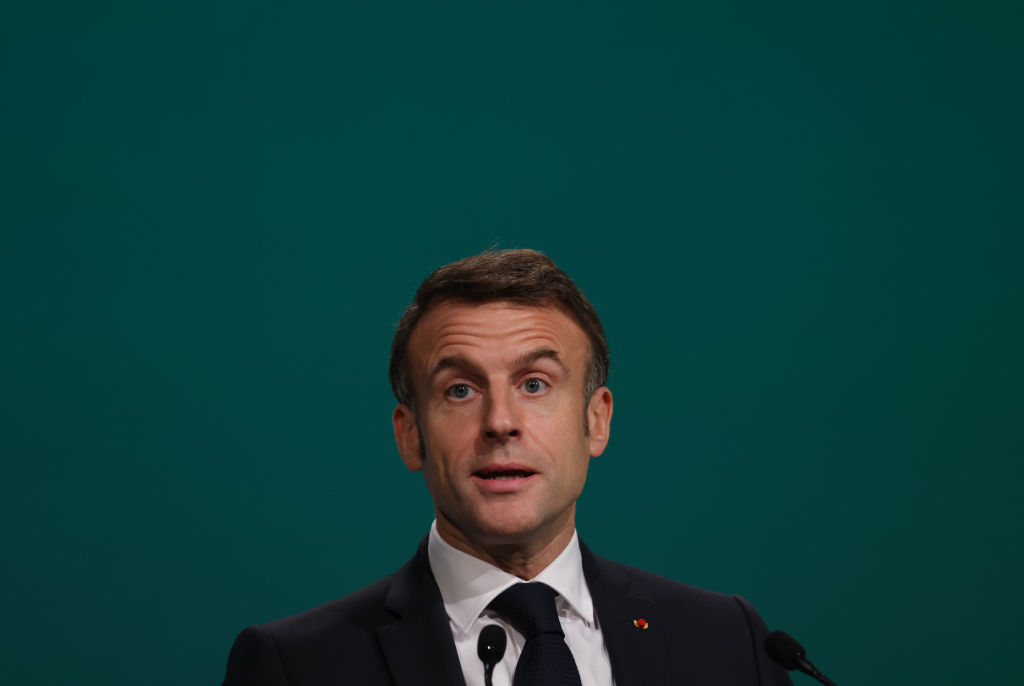New Year’s Eve passed off peacefully in France give or take the odd incident. There were 211 arrests in total, announced Interior Minister Gerald Darmanin, but overall the country saw in 2024 with good cheer.
In the days leading up to the last day of 2023, there were ominous warnings from the government about the possibility of a terrorist attack. Nearly 100,000 police, gendarmes and soldiers were deployed the length and breadth of France to counter such a threat but nothing materialised.
For a decade ‘populist’ has been the insult of choice for European centrists to describe anyone who dares deviate from their progressive dogma
Emmanuel Macron is praying that 2024 will be similarly uneventful from a security point of view. As the president said in his traditional New Year’s Eve address to the nation, this year is going to be a special one for France: not only is the country hosting the summer Olympics for the first time in 100 years, but the reconstructed Notre Dame cathedral will be unveiled, five years after it was ravaged by fire. According to Macron 2024 is a year of ‘determination, choices, recovery, pride. In fact, a year of hope.’
Chief among the ‘choices’ facing the French this year is June’s European election, and Macron invoked the spirit of the recently deceased Jacques Delors in urging the electorate to do the right thing at the polling booth. ‘We will have to make the choice of a stronger, more sovereign Europe in the light of the legacy of Jacques Delors,’ stated the president, declaring that voters must choose between ‘continuing Europe or blocking it’.
By ‘blocking it’, Macron means voting for one of the two conservative groups in the European parliament. One is Identity and Democracy, which includes Marine Le Pen’s National Rally, Germany’s AfD, and Italy’s Lega. The other is the European Conservatives and Reformists (ECR), to which Giorgia Meloni’s Brothers of Italy party, Poland’s Law and Justice, Vox of Spain and the Swedish Democrats belong.
Macron’s Renaissance party is part of the Renew group which, along with the European People’s party (that of Ursula von der Leyen, the EU President) were the centrist driving forces behind the recent EU pact on migration and asylum, described by Robert Jenrick as ‘not worth the paper it’s written on’. Marine Le Pen’s party agrees, describing the pact as ‘this mad project of organised submersion of Europe’, because there is nothing in the pact about stopping the small boats arriving in Europe, only about how best to manage all the arrivals.
That’s not the view of the Renew group. In response to the pact it issued a statement describing it as a ‘victory for Renew Europe and pro-European, centrist political forces’. A victory over whom? ‘The far-right and far-left [who] have consistently voted against the pact and only delivered fantasy and populist solutions.’
For a decade ‘populist’ has been the insult of choice for European centrists to describe anyone who dares deviate from their progressive dogma. Its impact has worn off in the last year or two, and the likes of Marine Le Pen and her party president, Jordan Bardella, believe that 2024 will be their year.
In her New Year’s Eve message, Le Pen hailed 2023 as a year in which her party’s ideas had ‘never been so validated’, a reference above all to the recent immigration Bill that was passed by the National Assembly.
Le Pen also declared her ambition for 2024: ‘As we’ve put Emmanuel Macron in a minority in the Assembly, now it’s up us to make his political family [Renew group] a minority in the European parliament’.
Leading the National Rally’s European campaign is the party’s 28-year-old president, Jordan Bardella, the rising star of French politics. Le Pen called on the party faithful to ‘all get behind Jordan Bardella’ ahead of June’s elections, and it seems that call is being heeded by more than just National Rally supporters.
Along with the presidential address, the other French tradition at the end of each year is the list of the 50 most popular personalities. It’s a list dominated by singers, actors and athletes, but this year there is an intruder: Jordan Bardella, a new entry at No. 30, the only politician to make the cut. Frédéric Dabi, France’s leading pollster, called Bardell’s appearance ‘an unprecedented achievement’.
Bardella has an unusual background for a French politician: raised by a single mum (an Italian immigrant) in a housing estate in the impoverished Seine-Saint-Denis. Bardella’s advantage over Le Pen is that he appeals to the young. He is also more economically literate than Le Pen and there is a growing feeling among some in the party that the National Rally’s best chance of winning the 2027 presidential election is if Bardella and not Le Pen is the candidate.
In the short term, however, Bardella’s focus is the European elections in June, and like Macron, he urged voters in his New Year’s message to get out and vote. ‘Your mobilisation is essential,’ he said, if France is to stop what Bardella called Macron and the EU’s ‘immigrationist madness’.
Macron is right. 2024 will be a year of choice, for France and for Europe.







Comments